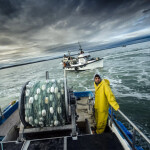Workers in Chile’s salmon processing sector have been protesting on the island of Chiloé – an industry production hub – arguing the companies they work for are not doing enough to protect them from the COVID-19 virus.
Last week, the national government closed off Chiloé to much of outside traffic, only allowing the circulation of transport it deemed essential, which includes the salmon industry. Declaring the measures inadequate, Chiloé residents and even town mayors have taken to the streets in protest, closing highways to prevent all traffic, including salmon industry trucks, from circulating.
In a recent closed-door meeting with Román Zelaya, the head of Chile’s Sub-Secretary of Fisheries and Aquaculture (Subpesca), to address the protests and the other effects of the coronavirus on Chile’s salmon industry, representatives of the country’s major salmon farming companies laid out the dire set of issues they are facing as a result of the protests and from the coronavirus.
“In this meeting, each company presented their problems and we could see that the fisheries that have operations in Chiloé are most affected, with several of them taking measures for the immediate closure of plants, where people have been fired due to these closings,” an industry executive that participated in the meeting told SeafoodSource.
The National Fisheries and Aquaculture Service (Sernapesca) has been streamlining procedures and taking steps for the fishing industry to be able to continue functioning during this emergency situation. But those measures appear not to have appeased Chiloé’s residents or workers.
“In [one] case, plant employees went on strike because they were afraid of getting infected [by COVID-19] if they continued to work,” the source said, who asked to remain anonymous and who declined from naming the cases of specific companies.
When contacted by SeafoodSource, a spokesperson from Multiexport denied the company has cut back on the number of shifts at its facilities or any scaling down of operations in Chiloé. A source familiar with AquaChile’s operations confirmed that there had been layoffs, but disputed claims that they included 700 workers, as market rumors had speculated. The source said AquaChile’s processing plants are continuing to operate, but would not say at what percentage.
“The majority of the workers had been hired under fixed-term contracts and they were paid the amount of time remaining [in those contracts],” the source said. “Due to the situation on the island, they were left free to return to their homes.”
Camanchaca President Ricardo García told Diario Financiero that the fact that trucks are unable to enter Chiloé could impede the flow of critical production supplies to the island and the transport of finished product to their final destination or to refrigerated warehouses for storage. Last week, the company suspended production of mussels at its Camanchaca Cultivos Sur plant on Chiloé and put about 300 of its workers on unpaid leave for two weeks. García called for Subpesca to help strike a balance between protective measures for the island’s residents and ensuring the continuance of the operations deemed essential by the government.
"The important thing is [for the measures to] be applied rigorously: That they be effective in stopping infections, but also that they be effective in allowing logistical continuity so that there is no economic collapse on the island," he said.
Salmon supply is already being squeezed by both the protests and by the precautionary measures being taken by salmon producers and processers, the industry insider said. And the situation is rapidly worsening.
“The Subpesca undersecretary warned of the very possible scenario in which we will reach a point where the industry is practically going to close, and it is going to have only a minimum of personnel working – those at the centers responsible for feeding the fish,” the source added. “There are some large companies that are functioning for half a shift [four hours], when they normally have three shifts [24 hours] in a day. That’s how little product is being processed. This is a very complicated scenario in Chile that is affecting immediate supply, especially in more developed countries where fresh salmon is more consumed, such as in the U.S. and Japan.”
Even a temporary shutdown of the salmon industry in Chile for a week or two as a prophylactic measure could have drastic economic consequences, the source said.
“It will interrupt the world's supply, considering that the country is the second-largest in salmon production,” he said.
But production has already tightened, according to the source. When the coronavirus crisis first hit, the problem that salmon producers had was in shipping product as international borders closed one by one and all airlines, including Latin America’s largest carrier, LATAM, were forced to drastically reduce operations due to plunging passenger numbers. In response many airlines decided to focus on cargo transport and adapted their fleets accordingly.
Then, in response to the effects coronavirus has had in consumer behavior worldwide, the retail sector increased its demand for frozen products. But according to the industry insider, the supply chains of both Chile and Norway, the world’s leading salmon-producing countries, are designed around the supply of fresh fish. There is a limited capacity of tunnel freezers and refrigerated warehouses, he said.
Finally, production has been drastically cut back due to lower demand, limited transportation, and lack of storage capacity. Striking fear into many in the industry is the Chilean government’s estimate that it expects the full effects of the COVID-19 pandemic to peak in late April or in May. If a shutdown lasts that long, “It’s going to have a very big impact,” according to the source.
“Because the salmon will have to be kept in the water, since there is no harvesting capacity,” he said. “By staying in the water, the populations get bigger and bigger and will require more food. So we are going to have a problem in the food supply. Another problem is the low amount of people who can carry out sanitary treatments, without being able to remove the product when it becomes a sanitary problem. Mortalities are going to increase a lot.”
Photo courtesy of Subpesca







